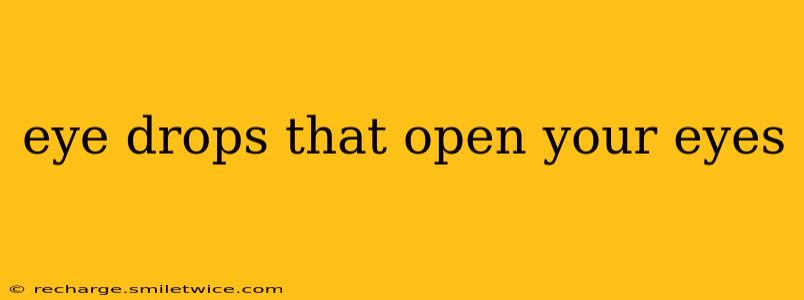Experiencing difficulty keeping your eyes open? While the idea of "eye drops that open your eyes" might seem like a magic bullet, the reality is a bit more nuanced. The inability to fully open your eyes usually stems from an underlying condition, not a simple lack of lubrication. This article explores the potential causes of eyelid spasms and drooping, and discusses appropriate treatments, emphasizing that self-medication with eye drops isn't typically the solution. Always consult an ophthalmologist or optometrist for diagnosis and treatment.
What Causes My Eyes to Stay Partially Closed?
Several factors can contribute to the sensation that your eyes are "closed" or struggling to open fully. These range from temporary irritations to more serious medical conditions.
Blepharitis:
This common inflammation of the eyelids can cause swelling, redness, and crusting, making it difficult to open your eyes completely. It's often related to bacterial infections, dry eye, or skin conditions like rosacea.
Dry Eye Syndrome:
Dry eye leads to irritation and discomfort, prompting involuntary eyelid closure to protect the eye from further dryness. The resulting discomfort often feels like your eyes are stuck shut.
Eyelid Spasms (Blepharospasm):
Involuntary contractions of the eyelid muscles can cause temporary or persistent eyelid closure. These spasms can be benign or associated with underlying neurological conditions.
Ptosis (Drooping Eyelid):
Ptosis is a condition where the eyelid droops, partially or completely obstructing vision. It can be caused by muscle weakness, nerve damage, or other medical issues.
Bell's Palsy:
This temporary facial paralysis can affect the muscles controlling eyelid movement, leading to difficulty opening the eye on the affected side.
Other Potential Causes:
Conditions like conjunctivitis (pink eye), allergies, foreign bodies in the eye, and even extreme fatigue can all contribute to the feeling that your eyes are struggling to open fully.
What Kind of Eye Drops Might Help? (Always Consult a Doctor First!)
While no eye drops directly "open" your eyes, certain types can address underlying causes and alleviate symptoms:
Artificial Tears:
For dry eye syndrome, artificial tears provide lubrication and can significantly improve comfort, reducing the urge to keep your eyes partially closed.
Anti-inflammatory Eye Drops:
If blepharitis or other inflammatory conditions are at play, your doctor might prescribe anti-inflammatory eye drops to reduce swelling and irritation.
Antibiotic Eye Drops:
In cases of bacterial conjunctivitis or blepharitis, antibiotic eye drops may be necessary to clear the infection.
Are There Home Remedies for Eyelid Spasms?
While home remedies won't cure underlying medical conditions, some techniques can provide temporary relief from eyelid spasms:
- Warm Compresses: Applying warm compresses to your eyelids can help relax the muscles and relieve tension.
- Gentle Massage: Gently massaging your eyelids can also help alleviate spasms.
- Rest: Adequate sleep and rest can reduce eye strain and muscle fatigue.
When Should I See a Doctor About My Eyelid Problems?
It's crucial to seek professional medical attention if:
- Your eye problems persist or worsen.
- You experience sudden or severe eyelid drooping.
- You have vision impairment due to eyelid issues.
- You notice any other unusual symptoms, such as pain, discharge, or changes in vision.
Can Eye Drops Cause My Eyes to Stay Closed?
Certain eye drops, especially those with preservatives, can sometimes cause irritation, leading to increased blinking and a feeling of discomfort that may make it seem as if your eyes are struggling to open. However, this is not a direct effect of "closing" the eye but rather a reaction to the medication. Always discuss any side effects with your doctor or pharmacist.
This information is for general knowledge and does not constitute medical advice. Always consult a qualified healthcare professional for diagnosis and treatment of any eye-related issues. Self-treating can be dangerous and delay proper medical intervention.
